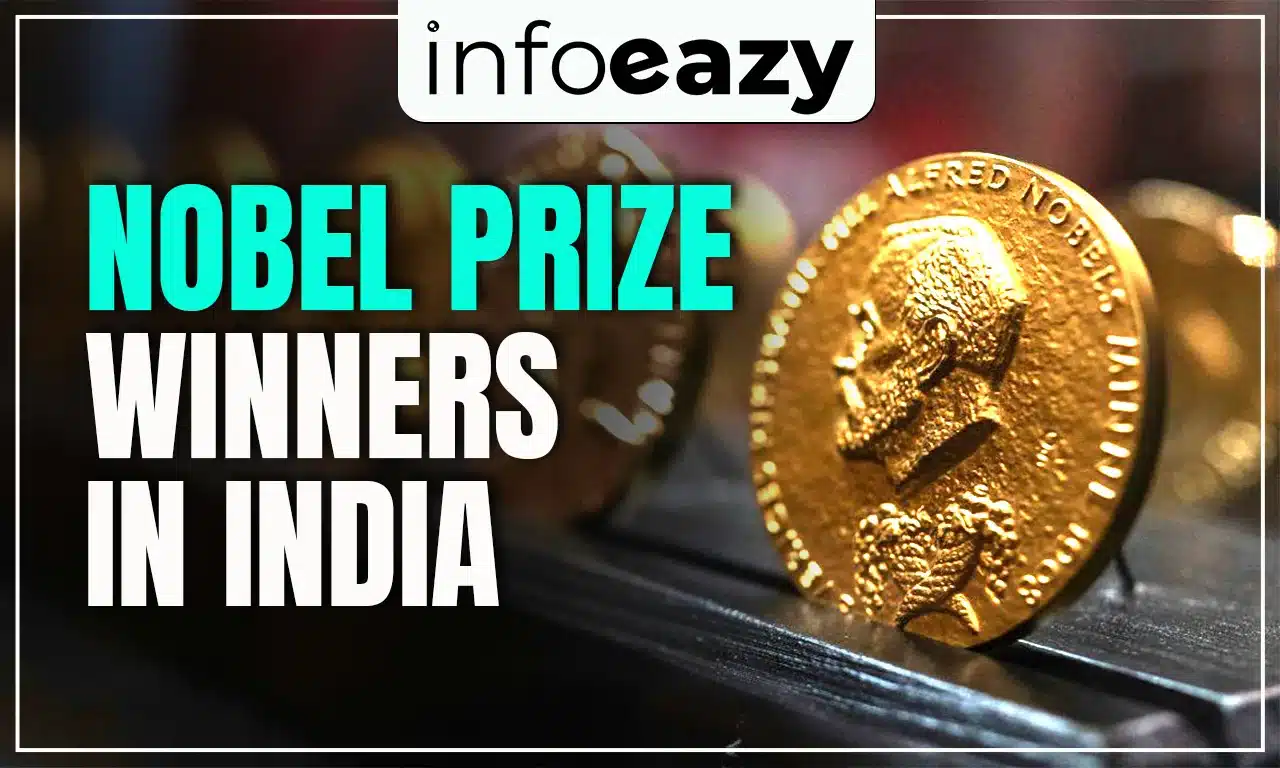The Nobel Prize stands among the most prestigious and globally recognized awards, honoring exceptional individuals whose work has significantly benefited humankind. Since its inception, several Indians and people of Indian origin have received this recognition across categories like Literature, Physics, Chemistry, Medicine, Peace, and Economics.
Each Nobel Laureate is presented with a gold medal, a diploma, and a cash prize, symbolizing excellence and contribution toward the betterment of society. This article explores the history, meaning, categories, and Nobel Prize Winners in India from 1913 to 2025.
Nobel Prize Winners in India
The Nobel Prize Winners in India represent some of the greatest minds and humanitarians who have made remarkable contributions to literature, science, peace, and economics. Since Rabindranath Tagore’s historic win in 1913, several Indians have been honored for their groundbreaking discoveries, creative brilliance, and social work that transformed lives globally. From C.V. Raman’s work in physics to Kailash Satyarthi’s tireless fight for children’s rights, these laureates reflect India’s rich legacy of intellect and compassion.
Also Check: Nobel Peace Prize 2025
The Nobel Prize is an international award granted annually to individuals or organizations that have made outstanding contributions in specific fields. The prize was established in accordance with the will of Alfred Nobel, a Swedish inventor, engineer, and philanthropist.
Since 1901, the Nobel Prize has been presented annually for remarkable achievements that have advanced science, literature, peace, and human welfare.
Categories of the Nobel Prize
Currently, six Nobel Prize categories exist. The first five were established in Alfred Nobel’s will (1895), and the sixth was added later in 1968.
| Categories of the Nobel Prize | |
| Category | Field of Contribution |
| Physics | Outstanding discoveries or inventions in the field of physics |
| Chemistry | Breakthroughs and research in chemistry |
| Physiology or Medicine | Discoveries in medical science improving human health |
| Literature | Remarkable works in poetry, prose, or drama |
| Peace | Efforts to promote peace and resolve conflicts |
| Economic Sciences | Research in economics that improves understanding of human welfare |
History of the Nobel Prize
The Nobel Prize traces its origin to the will of Alfred Nobel, a Swedish chemist, engineer, and inventor who created dynamite. Born in 1833, Nobel dedicated his life to scientific advancement and innovation. In his will of 1895, he stated that his wealth should be used to establish prizes recognizing individuals or organizations that had contributed most to the benefit of humankind. The first Nobel Prizes were awarded in 1901, marking the beginning of an enduring global tradition that honors excellence in various fields.
Key Points on the History of the Nobel Prize
-
- Founder: Established in memory of Alfred Nobel (1833–1896), who devoted most of his fortune to create the Nobel Foundation.
- First Award: The inaugural Nobel Prizes were presented in 1901 across five categories Physics, Chemistry, Medicine, Literature, and Peace.
- Addition of Economics: In 1968, the Sveriges Riksbank (Swedish Central Bank) introduced the Nobel Memorial Prize in Economic Sciences, expanding the list to six categories.
- Awarding Institutions:
-
- Physics & Chemistry – Royal Swedish Academy of Sciences
- Medicine – Karolinska Institute, Stockholm
- Literature – Swedish Academy
- Peace – Norwegian Nobel Committee, Oslo
- Economic Sciences – Royal Swedish Academy of Sciences
- Purpose: The prize is conferred upon individuals or organizations that have made exceptional contributions to humanity in their respective fields.
- Significance: Today, the Nobel Prize stands as one of the world’s most respected honors, recognizing innovation, humanitarianism, and intellectual excellence.
Indian Nobel Prize Winners (1913-2025)
India has produced several Nobel Laureates whose work has inspired generations. From Rabindranath Tagore’s poetic brilliance to Kailash Satyarthi’s relentless activism, each laureate has left a permanent mark on global history.
| Indian Nobel Prize Winners (1913-2025) | |||
| S.No. | Recipient | Category | Year |
| 1 | Rabindranath Tagore | Literature | 1913 |
| 2 | C.V. Raman | Physics | 1930 |
| 3 | Har Gobind Khurana | Medicine | 1968 |
| 4 | Mother Teresa | Peace | 1979 |
| 5 | Subrahmanyan Chandrasekhar | Physics | 1983 |
| 6 | Amartya Sen | Economics | 1998 |
| 7 | Venkatraman Ramakrishnan | Chemistry | 2009 |
| 8 | Kailash Satyarthi | Peace | 2014 |
| 9 | Abhijit Banerjee | Economics | 2019 |
Indian Nobel Laureates and Their Contributions
Rabindranath Tagore (1913 – Literature)
Rabindranath Tagore was the first Indian and Asian Nobel Laureate, honored in 1913 for his poetry collection Gitanjali. His lyrical and spiritual writings beautifully bridged Eastern philosophy with Western literature. Known as the “Bard of Bengal,” Tagore reshaped Indian art and culture through his poetry, music, and education. His work continues to inspire global appreciation for Indian thought and creativity.
C.V. Raman (1930 – Physics)
Sir Chandrasekhara Venkata Raman received the Nobel Prize in Physics in 1930 for discovering the Raman Effect, a phenomenon explaining the scattering of light. His research marked a major milestone in modern physics and placed Indian science on the world map. Raman’s groundbreaking discovery transformed optical studies and inspired generations of Indian scientists. He remains one of India’s most celebrated physicists.
Har Gobind Khurana (1968 – Medicine)
Har Gobind Khurana was awarded the Nobel Prize in Physiology or Medicine in 1968 for deciphering the genetic code and its role in protein synthesis. His pioneering research laid the foundation for modern genetics and biotechnology. Born in India and later working in the U.S., Khurana bridged the gap between molecular biology and medicine. His work revolutionized the understanding of how genes function.
Mother Teresa (1979 – Peace)
Mother Teresa received the Nobel Peace Prize in 1979 for her humanitarian service to the poorest of the poor. She founded the Missionaries of Charity in Kolkata, dedicating her life to caring for the sick, orphaned, and dying. Her compassion and devotion made her a symbol of selfless love across the world. Even decades after her passing, her legacy continues through thousands of charitable missions.
Subrahmanyan Chandrasekhar (1983 – Physics)
Subrahmanyan Chandrasekhar won the Nobel Prize in Physics in 1983 for his theoretical studies on the evolution of stars, which led to the discovery of the Chandrasekhar Limit. His research explained how stars collapse into white dwarfs, neutron stars, or black holes. A nephew of C.V. Raman, Chandrasekhar’s work remains a cornerstone in astrophysics. He is remembered as a scientific genius and an inspiration to astronomers worldwide.
Amartya Sen (1998 – Economics)
Amartya Sen was awarded the Nobel Prize in Economic Sciences in 1998 for his contributions to welfare economics and social justice. His work focused on poverty, inequality, and the role of freedom in economic development. Sen’s research reshaped how governments view human welfare and public policy. He remains a strong voice for ethical economics and inclusive growth.
Venkatraman Ramakrishnan (2009 – Chemistry)
Venkatraman Ramakrishnan received the Nobel Prize in Chemistry in 2009 for his studies on the structure and function of the ribosome. His discoveries helped scientists understand how proteins are produced in cells, a vital process for life. His research has had a profound impact on medicine and drug development. Ramakrishnan’s achievement highlighted India’s growing contribution to global scientific research.
Kailash Satyarthi (2014 – Peace)
Kailash Satyarthi was honored with the Nobel Peace Prize in 2014 for his campaign against child labor and advocacy for children’s education. A lifelong activist, he founded the Bachpan Bachao Andolan, rescuing thousands of children from slavery. Sharing the award with Malala Yousafzai, Satyarthi’s work brought global attention to children’s rights. His relentless fight continues to inspire movements for justice and education worldwide.
Abhijit Banerjee (2019 – Economics)
Abhijit Banerjee won the Nobel Memorial Prize in Economic Sciences in 2019 for his experimental approach to alleviating global poverty. Along with Esther Duflo and Michael Kremer, he developed field-based studies that improved policy-making in developing nations. His innovative research provided practical solutions to reduce poverty and inequality. Banerjee’s work represents a blend of academic brilliance and real-world impact.
Nobel Prize Winners in India FAQs
Q1. Who was the first Indian to win the Nobel Prize?+
Q2. How many Indians have won the Nobel Prize till now?+
Q3. Which Indian has won the Nobel Prize twice?+
Q4. Who was the first Indian woman to win the Nobel Prize?+
Q5. Who is the latest Indian Nobel Prize winner?+




